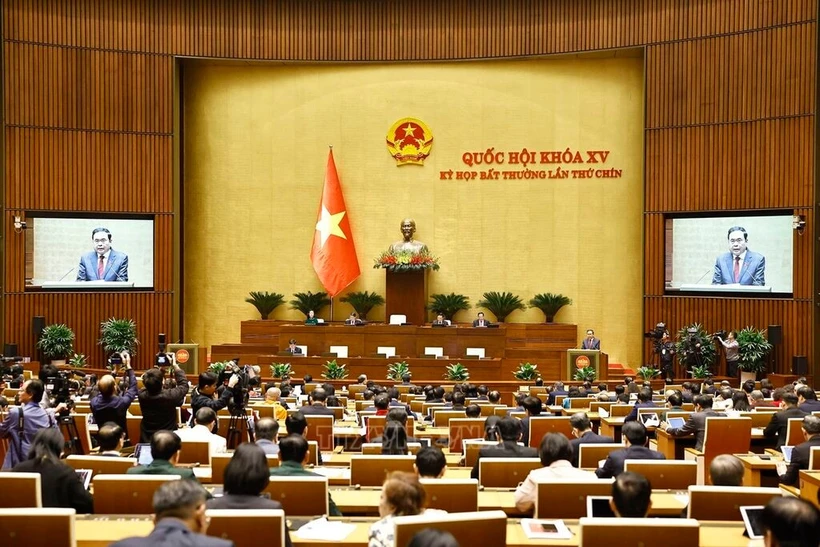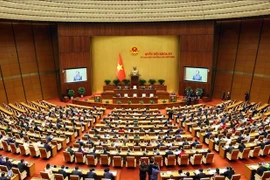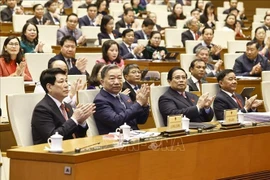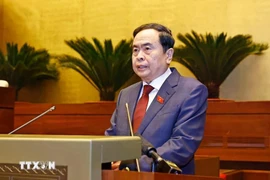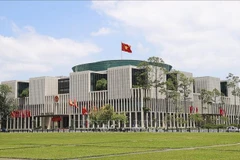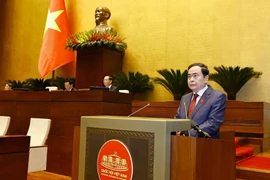Hanoi (VNA) - The National Assembly (NA) heard a report and a verification report on the revised 2025 socio-economic development plan which targets a growth rate of at least 8%, at the opening session of the 15th NA’s 9th extraordinary sitting on February 12.
Presenting the report, Minister of Planning and Investment Nguyen Chi Dung stated that, thanks to the high determination, great efforts, and decisive actions from the entire political system, people, and businesses under the leadership of the Party, especially the Politburo and the Secretariat, the country successfully and comprehensively fulfilled the socio-economic development goals for 2024, with all 15 key targets met or exceeded.
Many important indicators and indexes achieved outstanding results, higher than the estimated figures reported to the Party Central Committee and the National Assembly, gaining big praises from both the people and the international community.
The year 2025 holds special significance as the final year of the 5-year socio-economic development plan for 2021-2025. It is a year of acceleration and breakthroughs, aimed at achieving set goals. It also witnesses the organisation of Party congresses at all levels in preparation for the 14th National Party Congress and the preparation of the foundational elements necessary for the successful implementation of the 10-year Strategy for 2021-2030, signaling the beginning of a new development era for the country.

Therefore, the national GDP growth in 2025 needs to reach 8% or more, contributing to building a strong foundation for achieving a double-digit growth rate over a sustained period, starting from 2026. The growth should be rapid yet sustainable, with macroeconomic stability maintained, inflation controlled, major balances ensured.
According to the verification report presented by Chairman of the NA's Economic Committee Vu Hong Thanh, the committee generally agrees with the economic growth goals, requirements, and scenarios for 2025 outlined in the Government report. Proposing the National Assembly adjust the economic growth targets for 2025 reflects the Government's determination and efforts to successfully achieve the socio-economic development goals for the 2021-2025 period, thus creating a solid foundation to achieve double-digit growth over a sustained period, propelling the country into the era of strong development and prosperity.
Thanh said business and production activities have yet to show significant improvements in early 2025, highlighting the need to focus on analysing and evaluating implementation conditions to ensure project feasibility, with special attention to national financial security and public debt safety.
Regarding the average consumer price index (CPI) growth target of 4.5-5%, the committee considered the adjustment necessary to facilitate fiscal and monetary policy management while supporting economic growth. However, the core inflation rate in January reached 3.07%, higher than the 2023 average of 2.71%, indicating considerable inflationary pressure. Against the backdrop, the committee suggested the roll-out of inflation control measures that align with growth targets and help ensure macroeconomic stability.
According to the committee, to deliver on the GDP growth target of at least 8% in 2025, it is necessary to ensure legal corridors, promote intrinsic strength while maintaining groundwork for long-term and sustainable development. It laid stress on the importance of stabilising the macro-economy, managing major economic balances, and guaranteeing social security and national defence.
It also called for specific solutions to reform public investment management, assure the disbursement of allocated public investment funds, and develop concrete monetary and fiscal policies to boost consumer spending and domestic tourism. Additionally, it emphasised the need to reduce and simplify administrative procedures./.
